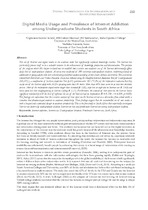| dc.description.abstract | The use of Internet and digital media in the academic sector has significantly improved knowledge creation. The Internet has
particularly proven itself to be a valuable resource in the enhancement of knowledge production and dissemination. The purpose
of the study on which this chapter is based was to establish how excessive non-academic use of the Internet detrimentally affects
daily lives of undergraduate students. A survey was conducted of 390 university undergraduate students, comprising mainly of
adolescents or young adults, who were selected using stratified random sampling at two South African universities. The universities
selected were Fort Hare and Nelson Mandela. Data was collected using the Modified Internet Addiction Test for Undergraduates
(MIATU), a modification of Internet Addiction Test (IAT) questionnaire. 282 (72.3%) of the respondents indicated that they
make use of the Internet daily with 34.8% spending more than 10 hours. More than 60% have access to at least two electronic
devices. Most of the respondents stayed online longer than intended (x̅ 2.88), slept less at night due to Internet use (x̅ 2.63) and
hence spent less time studying owing to Internet surfing (x̅ 2.27). Furthermore, the amount of time spent on the Internet had a
significant relationship with the level of influence the use of the Internet had on respondents (B = 0.250, t = 4.850, p<0.05).
The findings are indications that the excessive amount of time spent on the Internet served as a distraction from school work; a
situation that disadvantaged students in academic productivity. These findings suggest that the uncontrolled use of new media is
both a hazard and a potential danger to academic productivity. This is the first study in South Africa that empirically investigates
Internet use pattern by undergraduate students, Internet use rate and problematic Internet use among undergraduate students.
Keywords: Internet addiction, Internet use, Undergraduate Students, Problematic Internet use, South Africa. | en_US |

